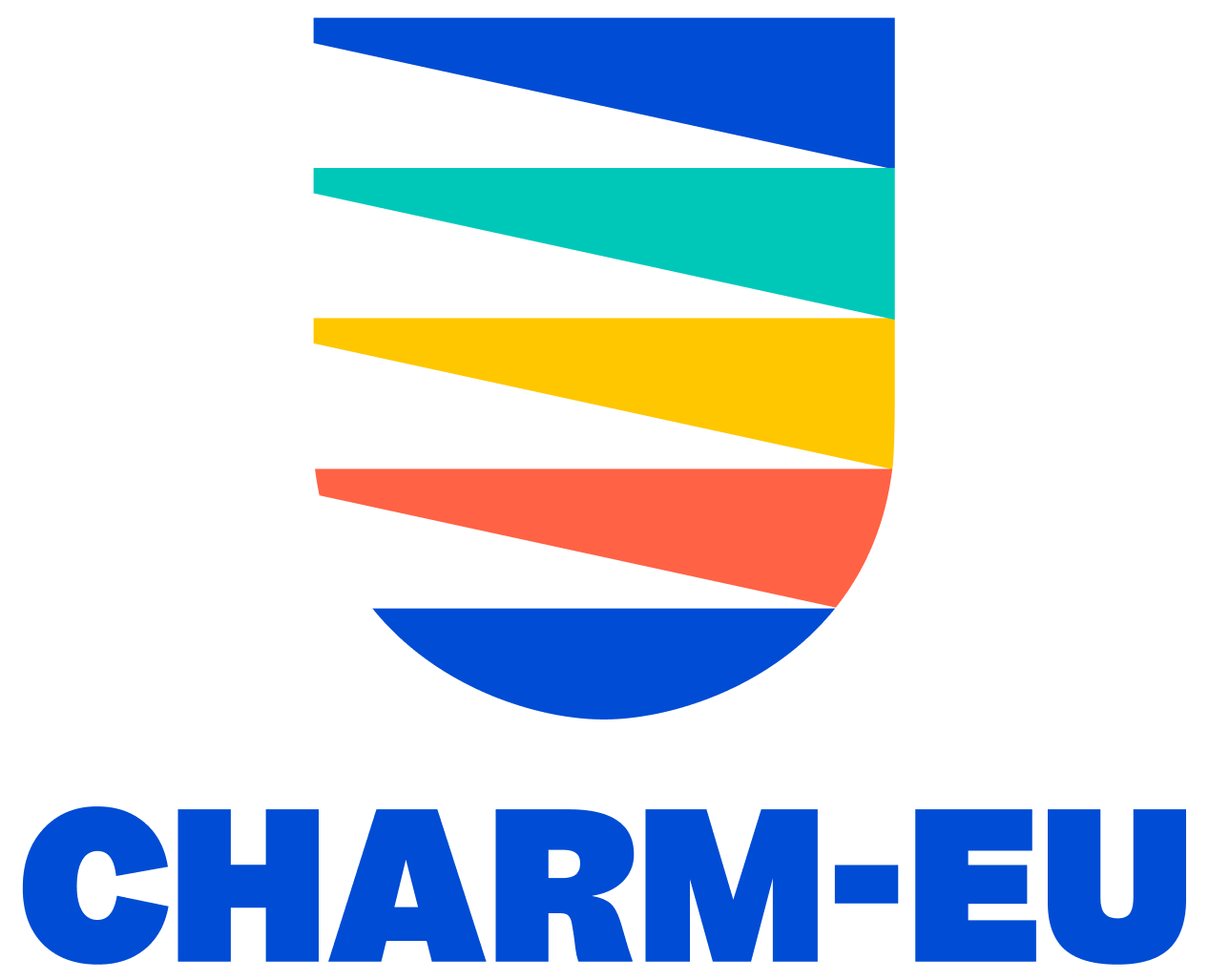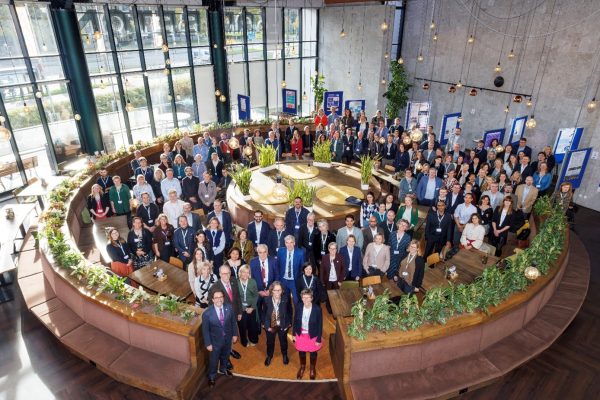Held in Utrecht, the Netherlands, the CHARM-EU Annual Conference 2025 brought together key opinion leaders, European policymakers, university leaders, innovators, academic staff members and students to discuss how European University alliances could contribute to Europe’s leadership in professional skills development, talent attraction, mobility, internationalisation and regional development, among others. Through inspiring plenary sessions with top speakers and impactful workshops, this one-day hybrid event critically examined how the European University alliance model could serve as a driver of European competitiveness.
Under the title Boosting European Competitiveness: European University Alliances as Catalysts for Innovation and Sustainability, the CHARM-EU Annual Conference 2025 gathered over 200 hundred attendees in Utrecht, including top representatives from member universities, the European Parliament, municipal and regional representatives and members from other European University alliances and institutions such as AURORA, ECIU, ENHANCE, EUGLOH, EUNICE, EUNICoast, EUt+, EUTOPIA, IN.TUNE, INVEST, NeurotechEU, SEA-EU, Student Council of EUPeace, Unite!, U!REKA, Una Europa, UNIC and YUFE.
As recently expressed in Barcelona, the CHARM-EU university leaders of the member institutions reaffirmed at the Annual Conference that “European University alliances are more than academic partnerships — they are driving forces of innovation, competitiveness, and European values. CHARM-EU stands at the forefront of this transformation, defending European values in pursuit of a sustainable and democratic world. Through collaborative, cross-boundary educational offerings grounded in science, research, and academic freedom, CHARM-EU works to redefine the future of higher education”.
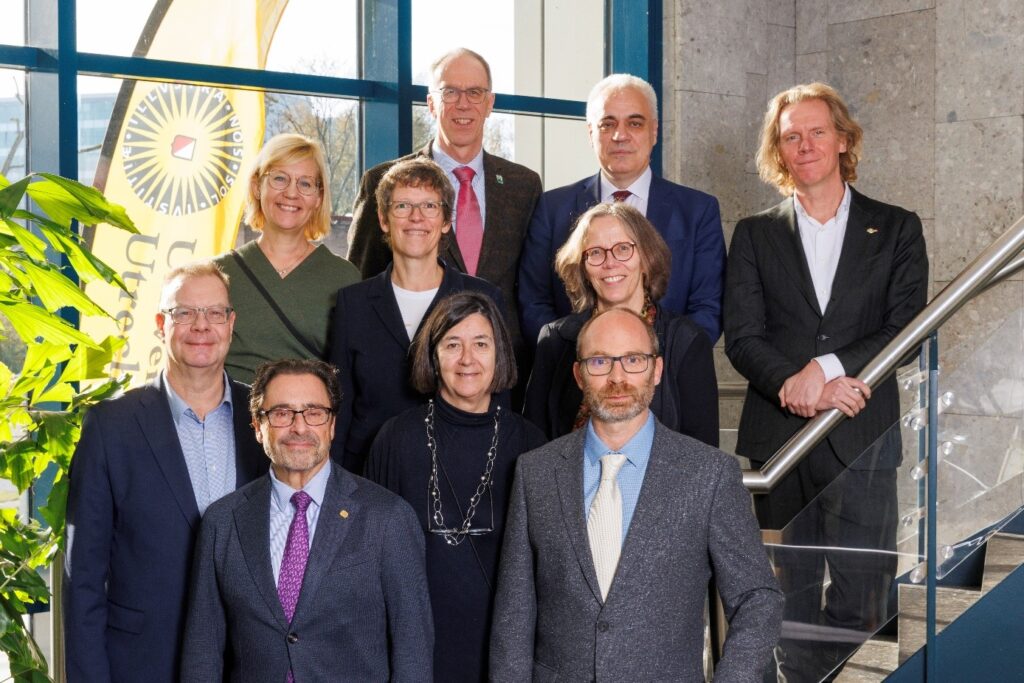
University leaders of CHARM-EU member universities in Utrecht for the Annual Conference 2025. Photo credit: Bas van Hattum.
Europe’s academic future
This conference highlighted the emergence of European University alliances as pivotal actors as the European higher education landscape undergoes one of its most ambitious transformations in recent decades. With continued support from the European Commission, the European Universities Initiative now encompasses 73 alliances, with almost 650 higher education institutions across Europe, fostering a transformative vision for the future of higher education in Europe.
At a time when Europe is facing multiple challenges, intensifying global competition for talent, and pursuing the dual digital and green transitions, the CHARM-EU Annual Conference 2025 conveyed a clear message: universities are not merely institutions of learning, but strategic catalysts for a stronger, more competitive and resilient Europe. This transformation reinforces the strategic role of the European University initiative, a visionary endeavour that must be sustained to secure Europe’s academic future.
Inspiring morning sessions
The morning sessions brought together leading voices from policy, academia, and industry to explore how universities could drive Europe’s innovation, digital transformation, and labour market adaptability — underscoring the power of collaboration in shaping the future of higher education. After a refreshing welcome from Wilco Hazeleger, rector of Utrecht University, the conference opened with a keynote by Thomas Estermann (EUA), who highlighted the shifting role of universities within European policy, as well as the necessity for sustainability transformation to go beyond technological fixes by embracing Europe’s values. He underlined a central observation: how important it was to ensure simple, stable, and efficient funding for university alliances.
The first panel explored how European University alliances could drive a competitive and socially just Union of Skills. Speakers – such as Olga Wessels (ECIU Alliance and FOREU4ALL), Marcos Ros Sempere (European Parliament) and Ludovic Thilly (Coimbra Group) – emphasised that alliances did serve as laboratories for Europe’s future, integrating education, research, and innovation to address major green, digital, and transversal skills gaps. Flexible and collaborative approaches—such as stackable micro-credentials, challenge-based learning, and close cooperation with employers—were then identified as crucial. The participants underscored the need for systemic collaboration across alliances and networks, alongside trust, long-term vision, and sustained political and financial commitment.
With key voices such as Clare Hart (City Council of Montpellier), Réka Judit (CHARM-EU Student Council) and Nadja Simons (University of Würzburg), the second panel offered perspectives from practitioners working at the intersection of alliances, cities, and regional ecosystems. Discussions highlighted the importance of mobility, interdisciplinarity, and transdisciplinarity in strengthening student experience and institutional collaboration. Participants noted that alliances acted as bridges between universities and cities, supporting youth engagement, strengthening regional cooperation, and demonstrating that human connection remains at the core of successful collaboration.
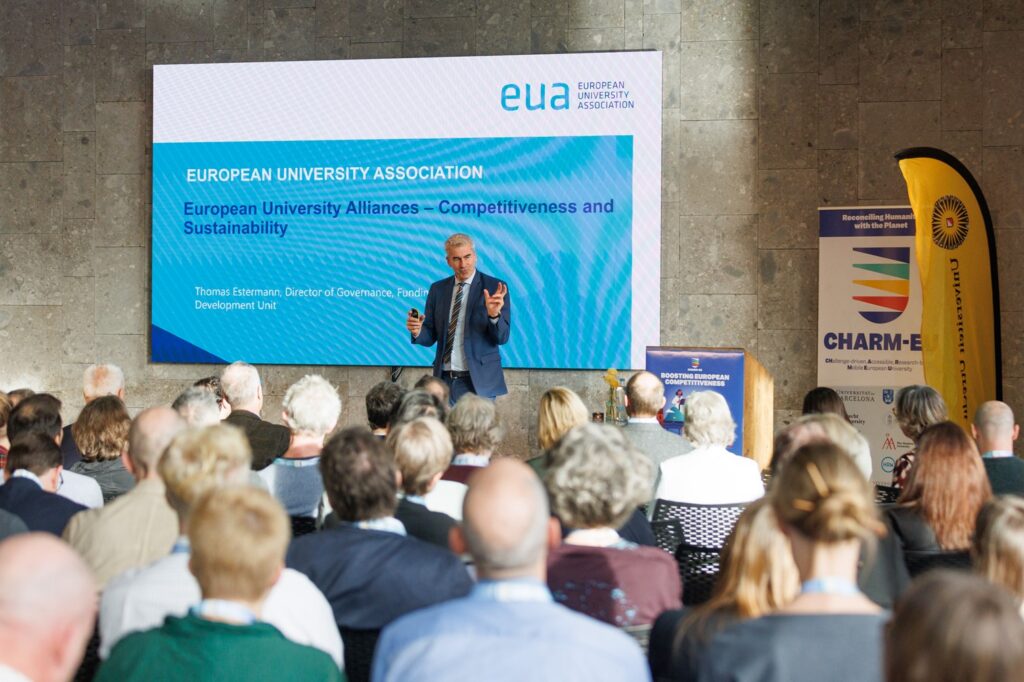
Thomas Estermann from EUA held the keynote sppech at CHARM-EU Annual Conference 2025. Photo credit: Bas van Hattum.
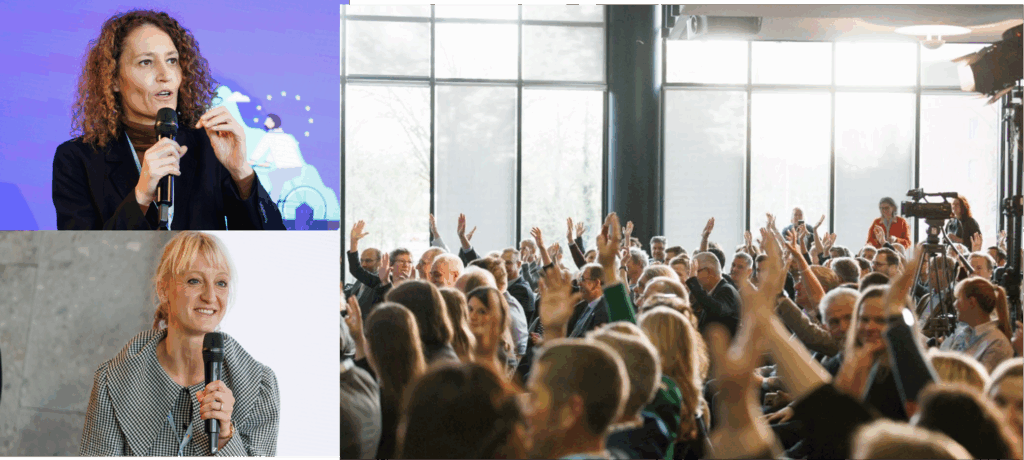
Left: Elena del Giorgio from 4EU+ and Olga Wessels from FOREU4ALL, panelists of the second plenary session. Right: Over 200 hundred people gathered in Utrecht for CHARM-EU Annual Conference 2025. Photo credit: Bas van Hattum.
Impactful afternoon workshops
The afternoon workshops translated the strategic discussions of the morning into practical applications with measurable impact, each addressing a core dimension of competitiveness within European higher education. The workshop on open science reaffirmed that open science and competitiveness were compatible when guided by the principle “as open as possible, as closed as necessary”. Whereas the one on research assessment reform examined how alliances could accelerate change through shared commitments such as CoARA and pointed out that the evolving European policy landscape represented an opportunity to embed assessment of reform at alliance level. On the topic of diversity, equity and inclusion, DEI emerged out of the discussions as a strategic necessity for attracting talent, fostering excellence, and ensuring societal relevance. The session on transdisciplinarity in regional development showcased how transdisciplinary collaboration could help address complex sustainability challenges, providing that those institutions offered adequate organisational support—such as funding frameworks, shared spaces, clear mandates, and mutual benefits for academic and external partners. Concerning the interoperability of IT systems, the workshop stressed out that IT interoperability was fundamental to making alliances truly competitive. And that progress depended on a shared vocabulary for IT systems, incremental institutional strategies, and trust-based collaboration between partner universities.
Students and alumnis were not overlooked, as a dedicated session focused on future-proof skills and alumni engagemment. Alumni perspectives highlighted the growing importance of ecological literacy, attentive listening, negotiation, intercultural competencies, adaptability, and critical thinking. “Hidden skills,” gained informally through project-based and experiential learning, were recognised as essential assets in contemporary professional environments.
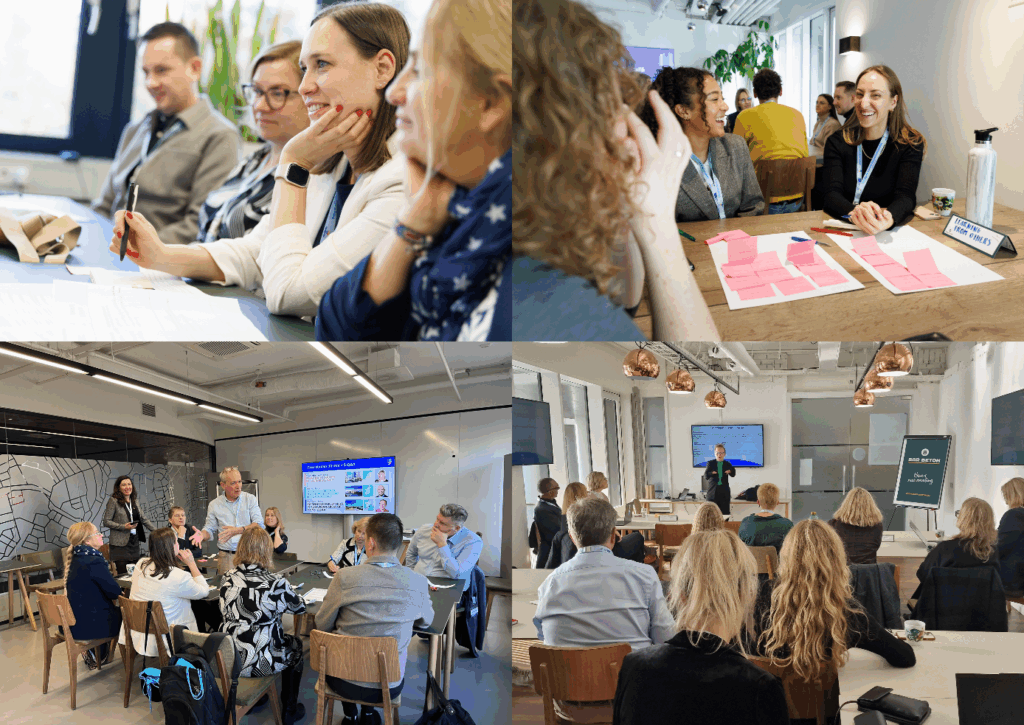
Attendees to the workshops. Six sessions were running in parallel. Photo credit: Bas van Hattum.
During the CHARM-EU Annual conference 2025, additional activities included a poster exhibition aligned with the conference theme, featuring over 18 contributions. All conference participants were invited to vote for the best poster, with the award ultimately going to Anouk Ruijters, Bente Haukes, Galang Gibran and Grace Fratello-Hakim, for the poster “Land Subsidence in Jakarta: a Threat and a Possibility”, a clear indication that the future of European University alliances is driven by the energy and engagement of their student communities.
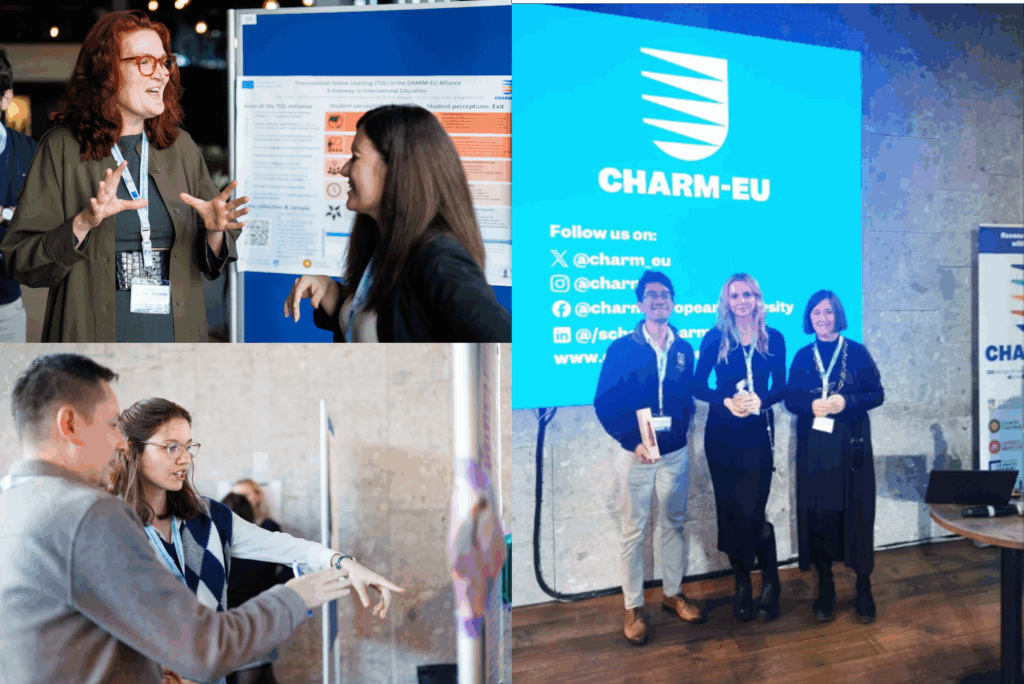
Left: Poster sessions at the conference. Right: Meritxell Chaves, Secretary General of CHARM-EU, with the winners of the AC25 poster award. Photo credit: Bas van Hattum and CHARM-EU Team.
